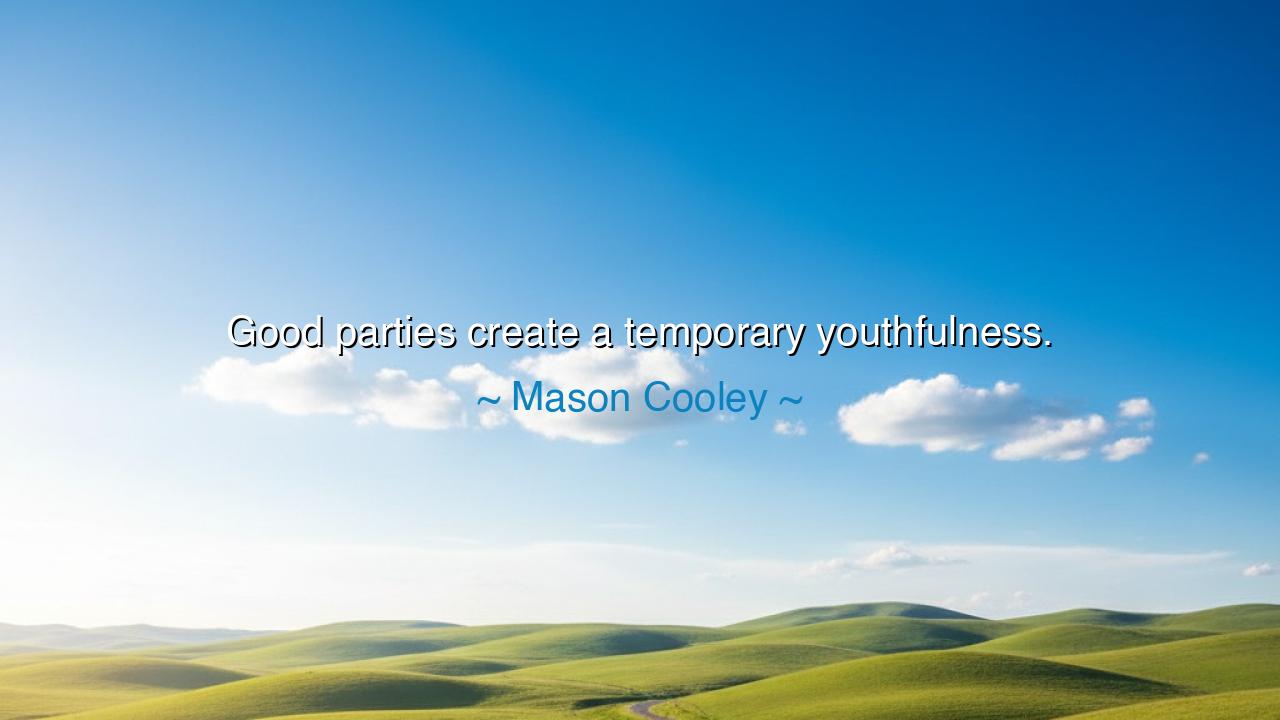
Good parties create a temporary youthfulness.






Hear, O children of time, the words of Mason Cooley, who proclaimed with subtle wisdom: “Good parties create a temporary youthfulness.” What appears simple, even playful, is in truth a profound reflection on the spirit of joy and the fleeting power of celebration. For youth is not merely a number of years, nor is it bound to the body’s strength; it is a fire within, a spark of freedom, laughter, and wonder. And when hearts gather in harmony, when music rises and spirits mingle, that spark is rekindled, granting to the old the vitality of the young, if only for a night.
The meaning of this saying rests in the mystery of youthfulness. Youth is a season of daring, of hope, of endless possibility. As age advances, cares and burdens often weigh upon the soul, dimming that flame. Yet Cooley teaches that a good party—where laughter is shared, fellowship deepens, and time itself is forgotten—can momentarily lift these weights, giving back the lightness of youth. This is not illusion, but memory awakened, as though life itself whispers: “You were once young, and you are still alive.”
The origin of such wisdom is rooted in the oldest traditions of mankind. From the festivals of the Greeks, who danced in honor of Dionysus, to the feasts of harvest across every culture, celebrations have always been more than food and drink. They were sacred rituals of renewal, giving warriors, farmers, and elders alike a taste of timeless vitality. In these gatherings, people remembered not only who they were, but that they belonged to something larger, something eternal. Such is the temporary youthfulness that Cooley names.
Consider the tale of the Florentine Renaissance. Florence, burdened by politics and rivalries, would still erupt into festivals of art, masquerades, and carnivals. In those hours, citizens forgot their troubles and felt reborn, as though the city itself had returned to youth. Even the weary statesmen and artists, bowed by labor, found fresh energy in the joy of shared celebration. And from such gatherings often sprang new ideas, friendships, and inspirations that outlived the fleeting hours of the feast.
Yet Cooley also reminds us that this youthfulness is temporary. A party does not erase the march of time, nor can it solve life’s enduring trials. When the music fades, the world returns. But this is no reason for despair; rather, it shows us that moments of joy are gifts to be cherished. Just as dawn does not last all day, yet nourishes the earth, so too does a night of laughter and fellowship nourish the human soul for the days ahead.
The lesson is clear: do not scorn joy as frivolous. Many in their seriousness look down upon celebration, calling it wasteful or shallow. But Cooley teaches that it has its sacred place. For joy restores strength, laughter heals wounds, and togetherness rekindles the fire of youth that still dwells in us all. To celebrate well is not to escape life, but to remind ourselves that life is worth enduring, and even worth rejoicing in.
Therefore, let us act with wisdom. Seek out not the hollow revelry that leaves emptiness behind, but the good parties—the gatherings where fellowship deepens, where music and mirth cleanse the soul, where time feels briefly suspended. Cherish those moments as gifts, knowing they cannot last, yet knowing also that their memory will remain, a spark to be carried into the burdens of tomorrow. For as Mason Cooley has shown, the true power of celebration is not in excess, but in the temporary youthfulness it breathes into weary hearts.






AAdministratorAdministrator
Welcome, honored guests. Please leave a comment, we will respond soon